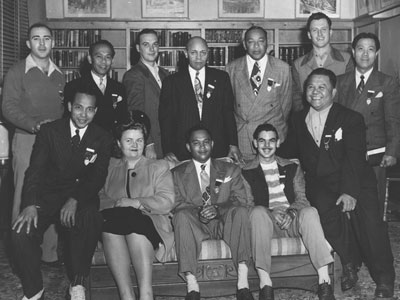
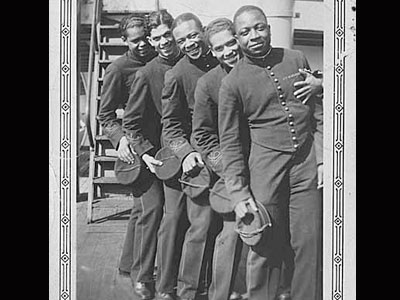
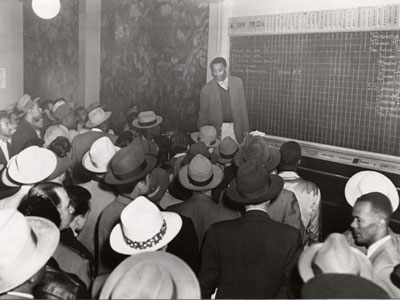
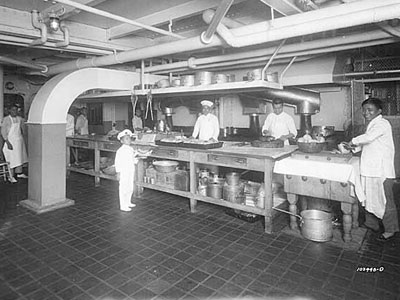
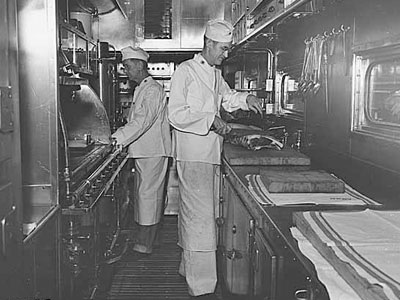
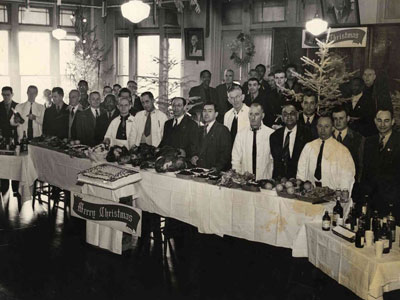


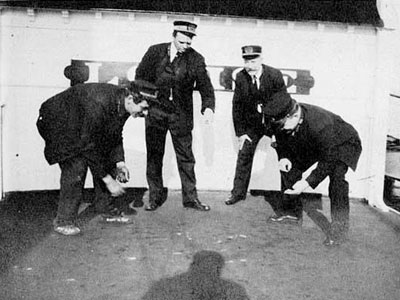

Photo Archive This is a sample of historical photographs. Links below lead to original essays, finding aids, and more.
Marine cooks and stewards have a history that includes not only important struggles for wages and working conditions but also for civil rights and civil liberties. In the early decades of the 20th Century, the workforce was largely white, while the union that represented them was exclusively so. By the 1950s workers of color dominated both the union and the trade. Black and Asian workers had to fight for those jobs and fought their way into the union; it represents a real victory against workplace segregation, and yet a very incomplete victory.
As some of the most onerous and least respected of all onboard labor, galley and service work was more open to nonwhite men, a situation the mirrored onshore realities. So even as the Marine Cooks and Stewards desegregated, most other maritime occupations - deck hands, seamen, engineers, firemen - remained segregated bastions of white labor.
The other interesting aspect of the MCS story is the role of communist organizers in helping to build the integrated union. Communists were some of the few Americans working for racial equality and civil rights in the early part of the twentieth century. As such, communist ideals became popular with many black stewards and among activists like Revels Cayton and Charlie Nichols who led the fight to desegregate the union. For more on the desegregation of the Marine Cooks and Stewards see George Robertson's essay Desegregating a Maritime Union: the Marine Cooks and Stewards.
More Information
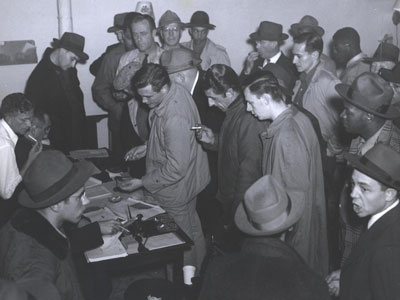 Marine Cooks and Stewards: Desegregating a Maritime Union The history of the National Union of the Marine Cooks and Stewards is one of segregation and racism, before being transformed by courageous black leadership in the inter-war period. Here we present an essay by historian and union organizer George Robertson on a critical period in MCS history.
Marine Cooks and Stewards: Desegregating a Maritime Union The history of the National Union of the Marine Cooks and Stewards is one of segregation and racism, before being transformed by courageous black leadership in the inter-war period. Here we present an essay by historian and union organizer George Robertson on a critical period in MCS history.
 Explore the finding aid of the Stephen R. Blair papers held at the University of Washington Special Collections. Blair was a MCS rank and filer, and life long partner of Frank McCormick, NUMCS officer and executive board member of the California CIO.
Explore the finding aid of the Stephen R. Blair papers held at the University of Washington Special Collections. Blair was a MCS rank and filer, and life long partner of Frank McCormick, NUMCS officer and executive board member of the California CIO.
View the finding aid of Peter Mendelsohn, a Marine Cooks and Stewards member and Communist Party organizer. His papers are held at the UW Special Collections Library.
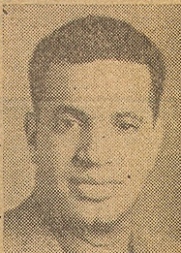 Revels Cayton was lead organizer in the Marine Cooks and Stewards and a longtime communist. Here you will find an essay by Sarah Falconer from the Seattle civil rights history page about his life and legacy . A briefer version is available here.
Revels Cayton was lead organizer in the Marine Cooks and Stewards and a longtime communist. Here you will find an essay by Sarah Falconer from the Seattle civil rights history page about his life and legacy . A briefer version is available here.
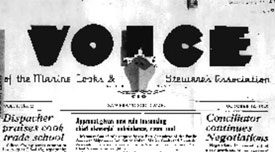 Read issues of the Voice from 1943, the newspaper of the Marine Cooks and Stewards.
Read issues of the Voice from 1943, the newspaper of the Marine Cooks and Stewards. The cooks and stewards were first organized in 1901 when their union charter called for an exclusively white union - to exclude Chinese and Asian workers in particular. The Marine Cooks and Stewards Association of the Pacific continued as a jim crow union throughout the first part of the century, and maritime employers used trade union racism to their advantage. In the 1921 sailor's strike, employers brought in black strike-breakers, the same workers who had been excluded from from the union for twenty years. These workers created a primarily black and minority organization, the Colored Marine Employees Beneficial Association of the Pacific (CMEBA), which for more than a decade represented African American cooks and stewards.
The legacy of segregation and hostility was partially overcome in the 1934 maritime strike. Black and white organizers were able to persuade workers of both races to strike together. After the '34 strike the CMEBA merged with the National Union of Marine Cooks and Stewards, but racism and segregation continued to plague the industry and the union. Communist organizers in particular argued for racial unity and in the 1940s African Americans made small but steady gains. By the 1950s the majority of members and leaders of the NUMSC were people of color.
By this time the union was also facing pressure from the outside. As part of the post-war business push against unions and working people, Congress passed the Taft-Hartley act of 1947. The law contained an anti-communism clause that forced a series of internal conflicts and purges within unions, in particular those with strong communist influence. The MSC was thrown out of the CIO in 1949 along with several other unions whose members refused the anti-communist pledge.
At this point the cooks and steward's union became the focus of a power struggle between the AFL linked sailor's union, and the then unaffiliated longshore workers' union (ILWU). In the early and middle 1950s a series of elections were held to determine how the cooks and stewards would affiliate. The racism of the AFL craft unions, and the communist influence of the longshoremen were key points of contention in the election. Although the NUMCS were leaning toward the ILWU, the sailor's union (SUP), managed to orchestrate an election that brought in other predominately white unions, who tipped the vote in favor of affiliation with the AFL. That vote also created the Pacific Division of the Seafarers International Union, formed when the Sailor's Union of the Pacific, the Marine Firemen, Oilers, and Watertenders and the Marine Cooks and Stewards merged. It wasn't until the 1970s that the Marine Cooks and Stewards were fully absorbed into the SIU.
The union of the cooks and stewards no longer exists, but maritime food and service workers face many of the same problems as workers in other industries. Employers seek to avoid union labor and outsource their fleets to "run-away" ports without labor protections. Furthermore, ship automation has led to reduced crew sizes and a diminished need for maritime food services. Marine cooks and stewards are still a vital part of the maritime workforce; their struggle for recognition and self-determination continues.